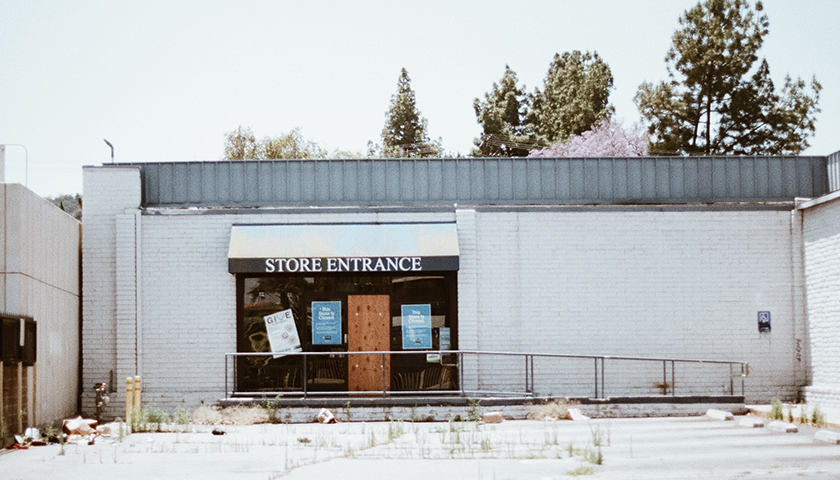by Scott McClallen
Vacant big box stores in Michigan become tax-reducing boons to retail companies statewide when those establishments have property assessed at rates sometimes 50% lower than previous rates.
This is known as a “dark stores” strategy, which often leaves local taxpayers to foot the tab.
An S&P report released Thursday found the strategy is employed nationwide.
“In essence, big box stores have argued that their in-use stores should be assessed for property tax purposes at levels comparable to vacant stores, known as dark stores,” S&P Global Ratings analyst Emma Drilias said in a statement.
That hits Michigan local governments hard since devalued properties reap less tax revenue, so either local taxpayers end up footing the bill via property taxes or millages, or statewide taxpayers pay since lost school tax revenue is backfilled from the Michigan Treasury.
Either way, there’s less money for municipal operations, emergency services, and libraries.
The issue isn’t settled, Stephanie Morita, a senior attorney at Farmington Hills-based Rosati, Schultz, Joppich, and Amtsbuechler told The Center Square in a phone interview.
“Hypothetically, you can compare a rock to a mansion. But should you? No,” Morita said.
“Any time you’re not valuing property according to our Constitutional requirement in the state of Michigan, which is through true cash value, you’re setting the system up to fail,” Morita said.
When you start improperly valuing one class of property, others will claim it too, Morita said, such as drug stores and banks who use deed-restricted-properties to limit potential buyers and drop sales prices so the company can use that vacant property as a comparable.
“If you had a drug store on the corner and they wanted to move across the street, they would deed-restrict the property they left to keep competition from moving in,” Morita said.
Morita said she’s handled cases in which property owners tried to use deed-restricted properties as comparables for at least 10 years.
Large Michigan retailers have previously assessed an average of $55 per square foot. Grand Rapids attorney Jack Van Coevering gave the following examples in testimony. But now:
Lowe’s stores in Michigan are assessed at $22.10 per square foot. In Lowe’s home state of North Carolina, the same stores are valued at $79.08 per square foot
Menards and Target stores in Michigan are valued at $24.97 per square foot. In Menards’ home state of Wisconsin, its stores are valued at $61.23 per square foot
Amy Drumm, the vice president of government affairs for the Michigan Retailers Association, said “[p]roperty is valued in Michigan based on the price the next buyer is willing to pay.”
Since many retail buildings are specially designed, they would require drastic modification for suitable use for another buyer, Drumm said.
“These retail properties have been over assessed by local government assessors who are trying to apply a value-in-use standard rather than value-in-exchange standard as Michigan law requires,” Drumm wrote in an email.
Drumm said retailers appealed property taxes and the courts adjusted the proper tax rate.
“Retailers are good, supportive members of the communities they serve,” Drumm said. “They employ hundreds of residents and collect and pay millions of dollars in taxes each year. They are happy to pay the appropriate rate based on the correct valuation of their property but can exercise their legal right to file an appeal if they feel the valuation is incorrect.”
Sen. Ed McBroom, R-Vulcan, told The Center Square that “dark stores” hit hard rural areas with smaller tax bases. Big box stores require more public expenses compared to smaller ones, but demand a much lower standard tax rate, he said.
It’s harder to fight fires at a 150,000-square-foot Costco facility than a small party store.
A Mining Journal report said total state Tax Tribunal decisions for Marquette Township businesses alone dropped $2.8 million for all taxing entities from 2009 to 2019.
“It erodes away at the functionality of our communities and our ability to provide vital infrastructure to not just those businesses, but all the others,” McBroom said. “And then the impact is also very real on the citizens themselves.”
McBroom questioned why policy would favor big stores with advantages, including economies of scale, loads of cash, and an “enormous” tax break over mom-and-pop businesses.
“We really want to fix this for the future viability of our small towns,” McBroom said.
Homeowners, small retailers, and other businesses can’t get the same deal.
McBroom said those who support “dark stores” paint opposition of it as supporting a tax increase, which he argues isn’t the case since those stores should have been paying higher taxes the entire time.
McBroom offered three possible solutions: the Tax Tribunal change their mind, the state adopt strong statutory policy otherwise, or Michiganders amend the Constitution.
There might be a decision out of the courts in the next year or two.
– – –
Scott McClallen is a staff writer covering Michigan and Minnesota for The Center Square. A graduate of Hillsdale College, his work has appeared on Forbes.com and FEE.org. Previously, he worked as a financial analyst at Pepsi.





